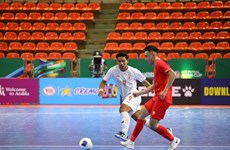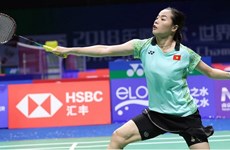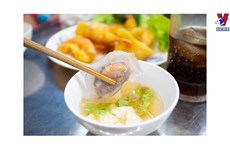International cooperation: key to national sports development strategy
Vietnam signed over 50 cooperation agreements and treaties with countries, territories, and international sports organisations around the world during 1998 to 2016.
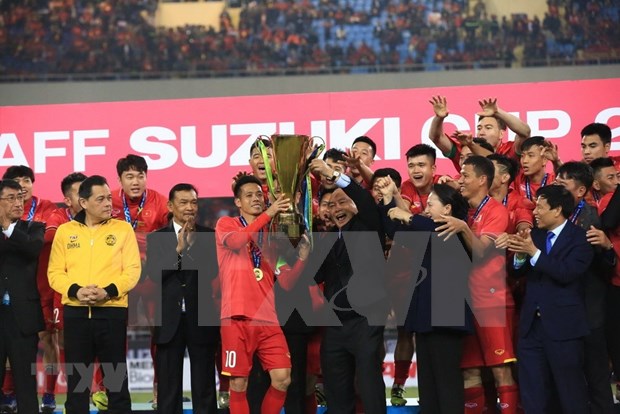 Vietnam's players celebrate with Prime Minister Nguyen Xuan Phuc (centre) after winning the AFF Suzuki Cup 2018 championship trophy (Source: VNA)
Vietnam's players celebrate with Prime Minister Nguyen Xuan Phuc (centre) after winning the AFF Suzuki Cup 2018 championship trophy (Source: VNA)Hanoi (VNA) - Vietnam signed over 50 cooperation agreements and treaties with countries, territories, and international sports organisations around the world during 1998 to 2016, a period that has seen the most thriving development in the sporting sector, said vice head of the Vietnam Sports Administration (VSA) Le Thi Hoang Yen.
In a recent interview granted to the Vietnam News Agency, Yen stressed that due attention has been paid to promoting sports development and physical education, focusing on expanding international cooperation – one of the top priorities towards realising goals set in the national strategy for development of physical education and sports to 2020, with a vision to 2030.
With its efforts to enhance international cooperation and integration in the period, Vietnam was credited by international sports organisations such as the Olympic Council of Asia (OCA) and the Southeast Asian Games Federation for hosting regional and continental sports events, including the 22nd Southeast Asian Games (SEA Games 22) in 2003, the Asian Indoor Games in 2009, the fifth Asian Beach Games in 2016, Yen noted.
These sports events offered a chance for Vietnam to promote its image to the world, leaving a deep impression of a peaceful, prosperous, and hospitable nation in the hearts of international friends, contributing to further upgrading its all-round relations with many countries worldwide, Yen said.
 The opening ceremony of the eight National Sports Festival takes place at My Dinh National Stadium in Hanoi on November 25 (Source: VNA)
The opening ceremony of the eight National Sports Festival takes place at My Dinh National Stadium in Hanoi on November 25 (Source: VNA)Vietnam’s entrance into the international sports movement
In 1976, the Vietnam National Olympic Committee (NOC) was established under Decision No.500 TGG by Prime Minister Pham Van Dong. It was officially recognised as a member of the International Olympic Committee (IOC) in 1980, enabling Vietnam to participate in Olympic Games, continental sports events, and those in Southeast Asia.
Previous story: [Vietnamese sport, more than games]
According to Yen, Vietnam’s participation in the Olympic Games in Moscow, Russia in 1980 marked a milestone of international collaboration for the Vietnamese sports sector, paving the way for the country to take part in events of this kind for years to come.In 1982, for the first time, the Vietnamese sports delegation participated in the Asian Games (ASIAD) in India. Vietnam has since sent its sporting delegations to this continental sports event consistently every four years.
After the sixth National Congress of the Communist Party of Vietnam in 1986, Vietnam’s sports sector began to promote international exchange and competitions, striving to become an active member of the IOC.
 Vice head of the Vietnam Sports Administration (VSA) Le Thi Hoang Yen (third, right) at the ceremony to see off Vietnamese athletes to SEA Games 29 in Kuala Lumpur, Malaysia (Photo provided by VSA)
Vice head of the Vietnam Sports Administration (VSA) Le Thi Hoang Yen (third, right) at the ceremony to see off Vietnamese athletes to SEA Games 29 in Kuala Lumpur, Malaysia (Photo provided by VSA)The country took part in the 15th Southeast Asian Games (SEA Games 15) in Malaysia in 1989. Since then, it has been participating in this regional sports arena every two years.
Besides regular attendance in regional, continental, and international sports events, Vietnam’s sports delegations have showed their significant progress and achieved high rankings at those gatherings.
Yen said that the remarkable achievements of the sports sector are greatly attributable to the exchange of sports delegations, training of athletes and coaches, and application of science and technology in the field of sports and physical training.
International cooperation
According
to the VSA, Russia is one of the most important strategic partners of Vietnam
in many aspects, with sports being the priority field. Vietnam
received huge support from Russia for its presence at the Olympic Games in
Moscow, Russia in 1980.
The latest memorandum of understanding (MoU) on sports cooperation between the two countries was inked by the Vietnamese Ministry of Culture, Sports, and Tourism and the Russian Ministry of Sports in Sochi, Russia in 2014. It aims to consolidate mutual support in sports.
 The Vietnamese Ministry of Culture, Sports and Tourism and the Russian Ministry of Sports signed a Memorandum of Understanding on sports cooperation in Sochi, Russia in 2014 (Source: bvhttdl.gov.vn)
The Vietnamese Ministry of Culture, Sports and Tourism and the Russian Ministry of Sports signed a Memorandum of Understanding on sports cooperation in Sochi, Russia in 2014 (Source: bvhttdl.gov.vn)
Accordingly, both sides have encouraged and supported their sports universities to enhance bonds in training and organising sports-related conferences. The two sides have also expanded the exchange of coaches and athletes and fostered cooperation among their sports leagues and associations.
The Russian Government promised to provide scholarships for Vietnamese students to pursue study in sports and physical training in Russia.
Besides Russia, Vietnam also had signed MoUs with other countries like the Czech Republic, Azerbaijan, Hungary, and Kazakhstan, mainly focusing on the exchange of sports delegations.
Yen said sports cooperation between Vietnam and developed countries was also one of Vietnam’s prioritised policies to expand exchange and multifaceted relations with foreign nations.
The typical example of this was China. With its fast development in sports, China actively supported Vietnam in this field
According to the VSA, Vietnam has regularly sent its athletes and coaches to sports training centres in China before important sports events like ASIAD or SEA Games, while China has also sent experienced coaches in some sports to Vietnam to support Vietnamese coaches or directly train Vietnam athletes. These have provided Vietnamese athletes with good opportunities to contact and exchange with professional and world-class athletes.
Some Chinese sports firms have sponsored Vietnamese teams in sports events, for example Li-Ning Co., providing clothes, shoes, and other training equipment.
A number of international organisations, such as the global football governing body FIFA and UNESCO, who have also supported the development of Vietnam’s sports sector.
The latest memorandum of understanding (MoU) on sports cooperation between the two countries was inked by the Vietnamese Ministry of Culture, Sports, and Tourism and the Russian Ministry of Sports in Sochi, Russia in 2014. It aims to consolidate mutual support in sports.
 The Vietnamese Ministry of Culture, Sports and Tourism and the Russian Ministry of Sports signed a Memorandum of Understanding on sports cooperation in Sochi, Russia in 2014 (Source: bvhttdl.gov.vn)
The Vietnamese Ministry of Culture, Sports and Tourism and the Russian Ministry of Sports signed a Memorandum of Understanding on sports cooperation in Sochi, Russia in 2014 (Source: bvhttdl.gov.vn) Accordingly, both sides have encouraged and supported their sports universities to enhance bonds in training and organising sports-related conferences. The two sides have also expanded the exchange of coaches and athletes and fostered cooperation among their sports leagues and associations.
The Russian Government promised to provide scholarships for Vietnamese students to pursue study in sports and physical training in Russia.
Besides Russia, Vietnam also had signed MoUs with other countries like the Czech Republic, Azerbaijan, Hungary, and Kazakhstan, mainly focusing on the exchange of sports delegations.
Yen said sports cooperation between Vietnam and developed countries was also one of Vietnam’s prioritised policies to expand exchange and multifaceted relations with foreign nations.
The typical example of this was China. With its fast development in sports, China actively supported Vietnam in this field
According to the VSA, Vietnam has regularly sent its athletes and coaches to sports training centres in China before important sports events like ASIAD or SEA Games, while China has also sent experienced coaches in some sports to Vietnam to support Vietnamese coaches or directly train Vietnam athletes. These have provided Vietnamese athletes with good opportunities to contact and exchange with professional and world-class athletes.
Some Chinese sports firms have sponsored Vietnamese teams in sports events, for example Li-Ning Co., providing clothes, shoes, and other training equipment.
A number of international organisations, such as the global football governing body FIFA and UNESCO, who have also supported the development of Vietnam’s sports sector.
Previous story: [Vietnam has high hopes for young athletes]
As a member of FIFA and the Asian Football Confederation (AFC), Vietnam’s football teams have received financial assistance and support for training and sports infrastructure development from the organisations. VFF President Le Hung Dung (R) and FIFA President Gianni Infantino (Source: VNA)
VFF President Le Hung Dung (R) and FIFA President Gianni Infantino (Source: VNA) President of the world football governing body FIFA Gianni Infantino recently pledged to support football development programmes in Vietnam.
FIFA will continue supporting the FIFA Goal Project in Vietnam by providing financial resources, the building of a laboratory and high-quality training room, and referee training, he said.
It has selected Vietnam as one of the participants in a pilot project to develop women’s football over a course of 18 months, sending its experts to help the Vietnam Football Federation build a long-term programme for the project.
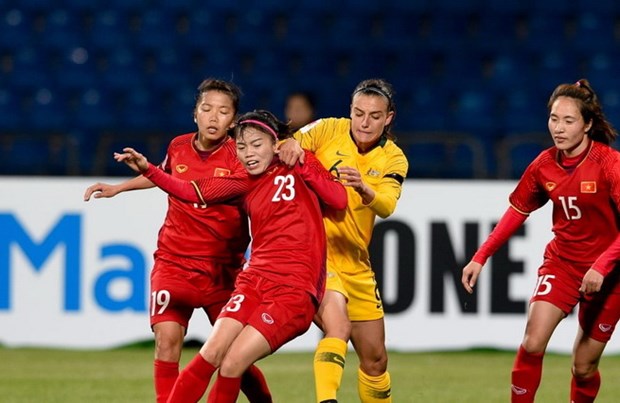 Vietnamese female footballers (in red) in an intense soccer competition (Source: the-afc.com)
Vietnamese female footballers (in red) in an intense soccer competition (Source: the-afc.com)By a different way, UNESCO also shown its interest in Vietnam’s sports development, especially its efforts to ensure a fair and equitable playing field and to protect young people involved in sports, funding the project called “Fund for the elimination of doping in sports” in 2013 and 2014 in Vietnam.
The projects included seminars in Hanoi, Ho Chi Minh City, and Da Nang, to the benefit of hundreds of athletes and coaches in different sports.
Many other developed countries like Japan, the UK, and especially the Republic of Korea (RoK) have also committed to supporting Vietnam in hosting big sports events.
Japan has promised to support Vietnam, not only in preparing for its hosting of regional sports events, but also in sports development in general.
According to head of the athletics section of the VSA Duong Duc Thuy, young Vietnamese football players have been offered the chance to go to Japan for long-term training.
This is expected to help Vietnam realise its targets at the Tokyo Olympics 2020, Thuy said.
Recently, the Vietnam Football Federation (VFF) and the Japan Football Association (JFA) signed a MoU on bilateral football cooperation.
Accordingly, the VFF and JFA will support each other at regional and international football forums, exchange human resources for football development, and provide assistance and training opportunities to their national football teams.
The two sides also pledged to share experience in football equipment management and football-related legal issues, while enabling each other’s trainers, referees, and officials to attend seminars held in each nation to exchange knowledge on football.
Early this year, the VFF signed a MoU with the RoK’s Football Association (KFA) in Hanoi, which will foster bilateral cooperation in regional and international football activities, exchange personnel, and send more experts to the two countries’ football events.
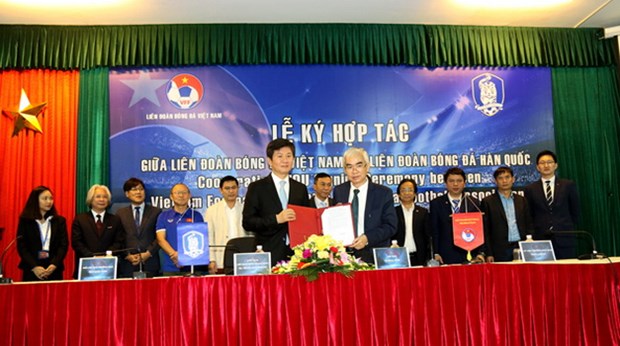 At the signing ceremony between the Vietnam Football Federation (VFF) and the Republic of Korea (RoK)’s Football Association (KFA) (Source: vff.org.vn)
At the signing ceremony between the Vietnam Football Federation (VFF) and the Republic of Korea (RoK)’s Football Association (KFA) (Source: vff.org.vn)The two sides agreed to send experienced trainers to support the national football academies, share experience in football management and regulations, as well as knowledge on sports medicine and rehabilitation.
VFF President Le Hung Dung stressed the great contributions made by RoK coach Park Hang-seo – head coach of Vietnam’s national men’s football team – and his assistants from the RoK towards the team’s silver medal at the Asian Football Confederation (AFC) U23 Championship in January this year.
KFA President Chung Mong-gyu said the deal will help boost Vietnam-RoK cooperation in personnel, young player training, and other issues. He vowed that his association will provide support for Vietnam’s football development.
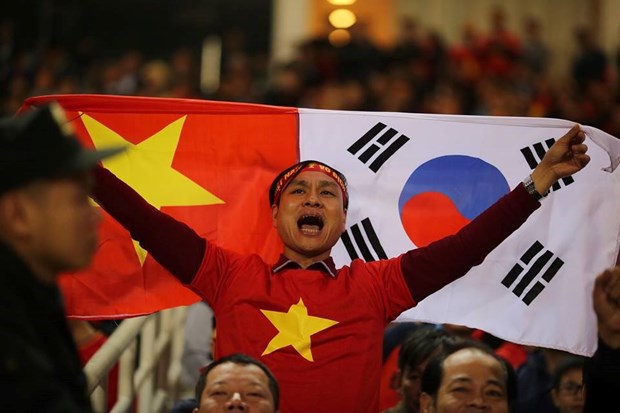 A Vietnamese football fan raises Vietnamese and RoK flags at the second-leg final match of the AFF Suzuki Cup 2018 on December 15, 2018 (Source: VNA)
A Vietnamese football fan raises Vietnamese and RoK flags at the second-leg final match of the AFF Suzuki Cup 2018 on December 15, 2018 (Source: VNA)Recently, RoK’s new visa policy for Vietnamese citizens is hoped to promote all-round ties between the two countries, including sports exchange.
RoK Ambassador to Vietnam Kim Do-hyon said that seeing Vietnamese people’s love for coach Park Hang-seo inspired the RoK Government to make its visa allowance decision.
 Head coach Park Hang-seo (C) in the flag-saluting ceremony before the first-leg of the AFF Suzuki Cup 2018 in Kuala Lumpur, Malaysia on December 11, 2018 (Source: VNA)
Head coach Park Hang-seo (C) in the flag-saluting ceremony before the first-leg of the AFF Suzuki Cup 2018 in Kuala Lumpur, Malaysia on December 11, 2018 (Source: VNA)The recent prominent achievements of Vietnam’s women’s and men’s football teams at regional events, and their rising positions in FIFA rankings, have shown the effectiveness of international partnerships in sports.
Vice head of the VSA Le Thi Hoang Yen stressed that the strong international cooperation contributes to not only improving the professionalism and performance of athletes, but also bettering the organisation and management capacity of managers, coaches, referees, and health workers in the sector.
It helps Vietnam map out specific policies for seeking out and training promising athletes, which requires a long-term, systematic, and scientific process, she noted.
Partnership formation with countries around the world, especially those with strong sports development, brings many benefits, contributing to attracting many international organisations and businesses to invest in sport, promoting the application of technology in training and the building of sports infrastructure facilities, she added.
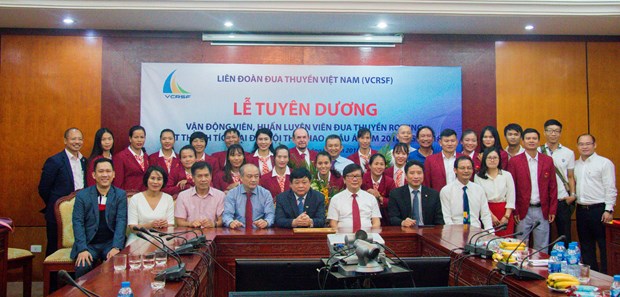 At a ceremony to commend Vietnamese rowing athletes after ASIAD 2018 in Indonesia (Photo provided by VSA)
At a ceremony to commend Vietnamese rowing athletes after ASIAD 2018 in Indonesia (Photo provided by VSA)However, experts have said that the limited foreign language proficiency of athletes and management staff makes it difficult for them to acquire knowledge and experience when attending training courses in foreign countries or in communicating with foreign experts and athletes.
They also mentioned financial difficulties in the international cooperation work, saying that this has a great impact on exchange and cooperation with developed countries such as the US and European countries due to the high cost of training activities.
According to the International Cooperation Department under the Ministry of Culture, Sports, and Tourism, the agency has built and submitted a strategy for international integration and cooperation until 2025 to leaders of the VSA.
The strategy focuses on training human resources with good foreign language proficiency; increasing support for bringing Vietnamese athletes and coaches to international sports events; promoting the organisation of international sports events in Vietnam; looking for more financial assistance from international organisations for sports development; and expanding collaboration in the application of science and technology in this field.
Vietnam prepares for international sports events
According to vice head of the VSA Tran Duc Phan, Vietnam’s sports sector is actively preparing for three upcoming regional and international sports events, which are the SEA Games 30 in the Philippines in November 2019, the 2020 Summer Olympics in Japan, and ASIAD 2022 in China
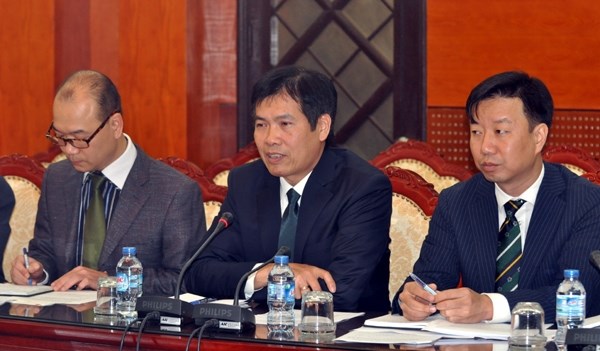 Vice head of the VSA Tran Duc Phan (C) at a reception for representatives from the General Administration of Sports of China in 2016 (Source: tdtt.gov.vn)
Vice head of the VSA Tran Duc Phan (C) at a reception for representatives from the General Administration of Sports of China in 2016 (Source: tdtt.gov.vn)The SEA Games is viewed as the most important arena for Vietnam at the moment because of its suitability for most of the country’s athletes at present, as well as providing motivation and preparation for the bigger arenas of the upcoming ASIAD and Olympics.
Notably, as the host of SEA Games 31 in 2021, Vietnam is expected to set itself ambitious targets, he noted. –VNA









